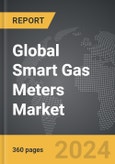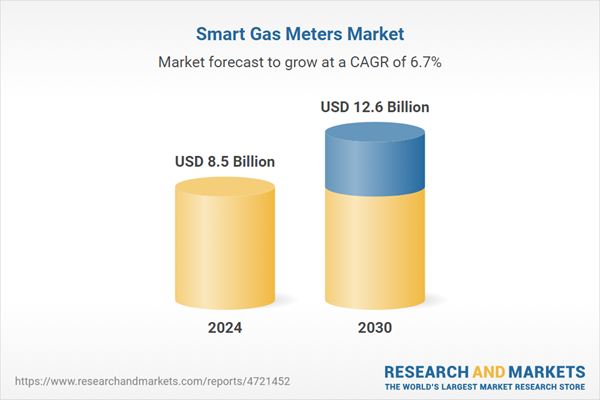Global Smart Gas Meters Market - Key Trends & Drivers Summarized
Smart gas meters are advanced metering devices that provide real-time monitoring and reporting of gas consumption for residential, commercial, and industrial users. Unlike traditional gas meters, which require manual readings and periodic inspections, smart gas meters automatically transmit usage data to utility companies via wireless communication networks. This real-time data collection allows for more accurate billing, reducing the likelihood of estimated bills and billing errors. Additionally, these meters can detect and alert users and utility providers to gas leaks or other anomalies in gas flow, enhancing safety and efficiency. The implementation of smart gas meters is part of a broader trend towards smart grids, which integrate advanced metering infrastructure (AMI) to improve the management and distribution of utilities.The technology behind smart gas meters includes features such as digital displays, remote shut-off capabilities, and integration with home energy management systems. These meters use a variety of communication technologies, including cellular networks, radio frequency (RF), and low-power wide-area networks (LPWAN), to transmit data. The integration of these technologies allows for seamless communication between the meter, the utility company, and the end-user. For consumers, this means better visibility into their gas usage patterns through online portals or mobile apps, enabling them to make more informed decisions about their energy consumption. For utility companies, the data collected from smart gas meters facilitates demand forecasting, efficient resource allocation, and proactive maintenance, ultimately leading to improved service reliability and reduced operational costs.
The growth in the smart gas meter market is driven by several factors. Technological advancements, such as improvements in communication protocols and sensor technologies, have made smart meters more reliable and cost-effective, encouraging widespread adoption. The increasing emphasis on energy efficiency and the reduction of greenhouse gas emissions has prompted governments and regulatory bodies to mandate the use of smart metering solutions, providing a significant boost to the market. Additionally, the rising awareness among consumers about the benefits of real-time monitoring and the desire for more control over their energy usage have further fueled demand. Utility companies are also motivated to adopt smart gas meters due to the operational efficiencies they offer, including reduced labor costs for meter readings and enhanced capabilities for detecting and responding to gas leaks. Furthermore, the global push towards smart cities, which rely on interconnected systems and data-driven decision-making, has created a favorable environment for the deployment of smart gas meters. These factors collectively contribute to the robust growth of the smart gas meter market, as stakeholders recognize the value of advanced metering infrastructure in achieving sustainability and operational excellence.
Report Scope
The report analyzes the Smart Gas Meters market, presented in terms of market value (USD). The analysis covers the key segments and geographic regions outlined below.- Segments: Technology (Automatic Meter Reading (AMR), Advanced Meter Infrastructure (AMI)); End-Use (Residential, Commercial, Industrial).
- Geographic Regions/Countries: World; USA; Canada; Japan; China; Europe; France; Italy; UK; Rest of Europe; Asia-Pacific; Rest of World.
Key Insights:
- Market Growth: Understand the significant growth trajectory of the Advanced Meter Infrastructure (AMI) Technology segment, which is expected to reach US$4 Billion by 2030 with a CAGR of 8.8%. The Automatic Meter Reading (AMR) Technology segment is also set to grow at 5.8% CAGR over the analysis period.
Why You Should Buy This Report:
- Detailed Market Analysis: Access a thorough analysis of the Global Smart Gas Meters Market, covering all major geographic regions and market segments.
- Competitive Insights: Get an overview of the competitive landscape, including the market presence of major players across different geographies.
- Future Trends and Drivers: Understand the key trends and drivers shaping the future of the Global Smart Gas Meters Market.
- Actionable Insights: Benefit from actionable insights that can help you identify new revenue opportunities and make strategic business decisions.
Key Questions Answered:
- How is the Global Smart Gas Meters Market expected to evolve by 2030?
- What are the main drivers and restraints affecting the market?
- Which market segments will grow the most over the forecast period?
- How will market shares for different regions and segments change by 2030?
- Who are the leading players in the market, and what are their prospects?
Report Features:
- Comprehensive Market Data: Independent analysis of annual sales and market forecasts in US$ Million from 2024 to 2030.
- In-Depth Regional Analysis: Detailed insights into key markets, including the U.S., China, Japan, Canada, Europe, Asia-Pacific, Latin America, Middle East, and Africa.
- Company Profiles: Coverage of players such as ABB Ltd., Accenture PLC, Atos SE, Capgemini SE, CGI, Inc. and more.
- Complimentary Updates: Receive free report updates for one year to keep you informed of the latest market developments.
Some of the 75 companies featured in this Smart Gas Meters market report include:
- ABB Ltd.
- Accenture PLC
- Atos SE
- Capgemini SE
- CGI, Inc.
- Badger Meter, Inc.
- Arqiva Ltd.
- Aclara Technologies LLC
- Apator SA (Apator Group)
- Advanced Electronics Company
- AddGroup
- CAS Tecnologia
- Chongqing Shancheng Gas Equipment Co., Ltd.
- China Minsen Meter Co., Ltd.
- Aichi Tokei Denki Co., Ltd.
This edition integrates the latest global trade and economic shifts into comprehensive market analysis. Key updates include:
- Tariff and Trade Impact: Insights into global tariff negotiations across 180+ countries, with analysis of supply chain turbulence, sourcing disruptions, and geographic realignment. Special focus on 2025 as a pivotal year for trade tensions, including updated perspectives on the Trump-era tariffs.
- Adjusted Forecasts and Analytics: Revised global and regional market forecasts through 2030, incorporating tariff effects, economic uncertainty, and structural changes in globalization. Includes historical analysis from 2015 to 2023.
- Strategic Market Dynamics: Evaluation of revised market prospects, regional outlooks, and key economic indicators such as population and urbanization trends.
- Innovation & Technology Trends: Latest developments in product and process innovation, emerging technologies, and key industry drivers shaping the competitive landscape.
- Competitive Intelligence: Updated global market share estimates for 2025, competitive positioning of major players (Strong/Active/Niche/Trivial), and refined focus on leading global brands and core players.
- Expert Insight & Commentary: Strategic analysis from economists, trade experts, and domain specialists to contextualize market shifts and identify emerging opportunities.
Table of Contents
Companies Mentioned (Partial List)
A selection of companies mentioned in this report includes, but is not limited to:
- ABB Ltd.
- Accenture PLC
- Atos SE
- Capgemini SE
- CGI, Inc.
- Badger Meter, Inc.
- Arqiva Ltd.
- Aclara Technologies LLC
- Apator SA (Apator Group)
- Advanced Electronics Company
- AddGroup
- CAS Tecnologia
- Chongqing Shancheng Gas Equipment Co., Ltd.
- China Minsen Meter Co., Ltd.
- Aichi Tokei Denki Co., Ltd.
Table Information
| Report Attribute | Details |
|---|---|
| No. of Pages | 360 |
| Published | February 2026 |
| Forecast Period | 2024 - 2030 |
| Estimated Market Value ( USD | $ 8.5 Billion |
| Forecasted Market Value ( USD | $ 12.6 Billion |
| Compound Annual Growth Rate | 6.7% |
| Regions Covered | Global |









